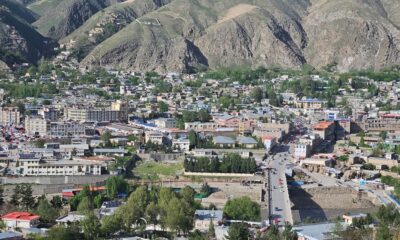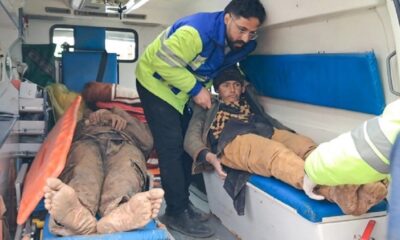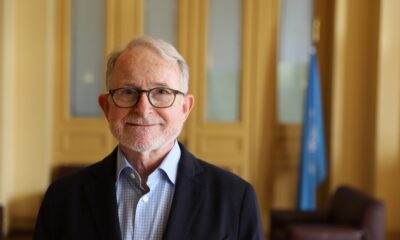Opinion
OPINION: The awful truth about growing up in Afghanistan
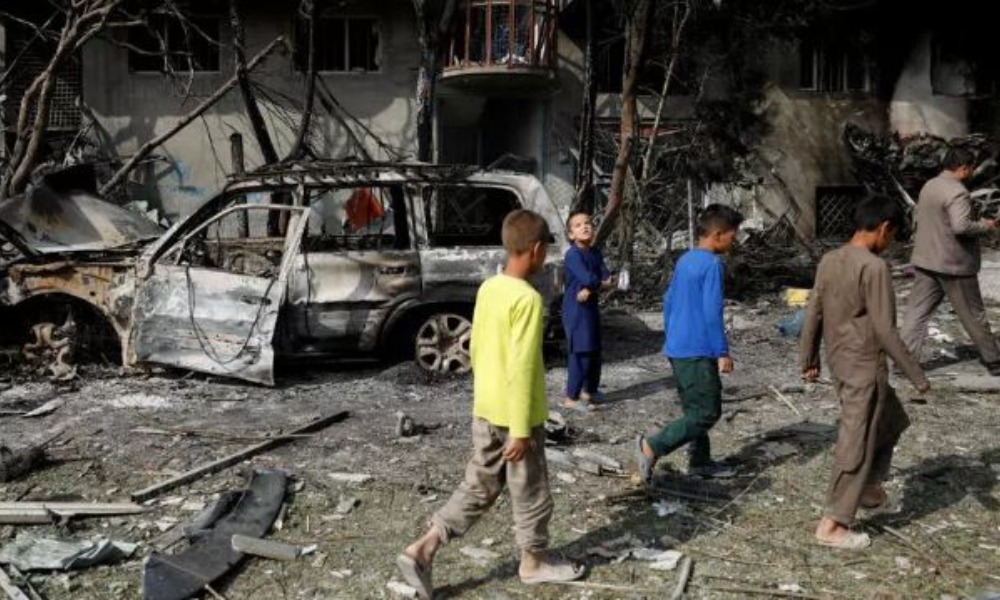
On a Saturday afternoon in late October, a suicide bomber tried to enter an education centre in Kabul. Prevented from doing so by security guards, the attacker entered a nearby lane and set off the explosives. At least 24 people were killed including schoolchildren. Many more were injured.
A colleague’s daughter survived the attack, but many more parents are still in mourning.
In the same month, an airstrike in the north-east of the country hit a school, reportedly killing at least 12 children. Insurgents were the intended target. Cold comfort for the grieving parents whose loved ones were killed in an act of fire and fury.
Attacks like this, that violate the laws of war, that directly impact children, are far too common in Afghanistan. If they occurred in the western world there would be widespread condemnation. Sadly, they often go under-reported as a result of competing global news stories, such as the COVID19 pandemic and the US Presidential election.
As the UN revealed in its latest report on the civilian cost of the Afghan war, nearly 1,900 children were killed or maimed in the first nine months of 2020.
This is truly shocking.
A 14-year-old Afghan girl told us, “When fighting breaks out, no place is safe in our village, but home is still better than outside. We hide in the corners of rooms.”
The awful truth is that every child in Afghanistan today has grown up in conflict.
The escalation in violence has hindered the education of children, too. The Global Coalition to Protect Education under Attack recorded more than 300 attacks on schools between 2017 and 2019, which injured or killed at least 410 students and teachers.
Even before the COVID19 pandemic, an estimated 3.7 million children, almost half of all primary school aged children, were out of school.
The impact of this on children is severe.
Lack of access to education leads to an increased risk of abuse and exploitation. And we know that in Afghanistan 93 per cent of late primary school-aged children are not proficient in reading. For 15 to 24-year-olds literary is 65 per cent.
The nation’s under-investment in education, presently 78 per cent less than the average for the South Asia region will have profound impact for years to come, but especially for girls.
Educated girls are crucial to the lasting peace of a conflict-affected country like Afghanistan. We know from experience that educated girls experience improved health and nutrition and contribute to better economic performance and growth.
We’re extremely concerned that 60 per cent of school-age children missing out on their education are girls. This would not be tolerated in the UK, the US or Australia, so why is it acceptable in Afghanistan?
And now the country has to cope with the COVID19 pandemic. In a country where the dilapidated health system has also been attacked, where doctors and nurses have been killed too.
All this in a country where nearly 50 per cent of the population, 18.4 million people, will need humanitarian assistance this year. Where 5.5 million people could soon experience famine conditions and 3 million children under the age of five suffer from under-nutrition, according to the UN.
Little wonder that Afghanistan is one of the worst places in the world to be a child.
It therefore beggars belief that despite a dramatic rise in humanitarian need, international aid to Afghanistan has tumbled. Donors have gradually funded less and less of the UN’s annual pleas for humanitarian support, from 87.5% in 2016 to 76% in 2019. This year’s appeal has so far only received a pitiful 40% of what is needed.
That’s why in the upcoming day Afghanistan donor conference in Geneva is crucially important.
At this conference, which takes places as nascent peace talks offer cautious hope for a political settlement to the war, the international community must deliver increased funding for education, especially for girls, as well as protect the interests of people with disabilities and other vulnerable groups.
There must be increased spending on public health to dramatically improve life-expectancy outcomes of children, many of whom are having to live with life-altering injuries due to being caught up in the conflict.
The international community must work with the government of Afghanistan to ensure national laws related to the protection of children are fully resourced and rolled out nationwide. And it must continue work to help secure an enduring peace settlement so that future generations of children grow up free from the fear of violence and death.
This and more must be our commitment to a nation whose people have endured decades of hardship, conflict and violence. Indeed, it is vital so that a country racked by decades of fighting and division is able to forge a better future for all its citizens.
Written by Chris Nyamandi, Save the Children’s Country Director for Afghanistan

Opinion
Afghanistan ‘cracking down’ on militants; ‘resetting’ relations with Pakistan
Things started to change in March, when a high-level Pakistani delegation led by Special Envoy for Afghanistan, Muhammad Sadiq Khan, visited Kabul
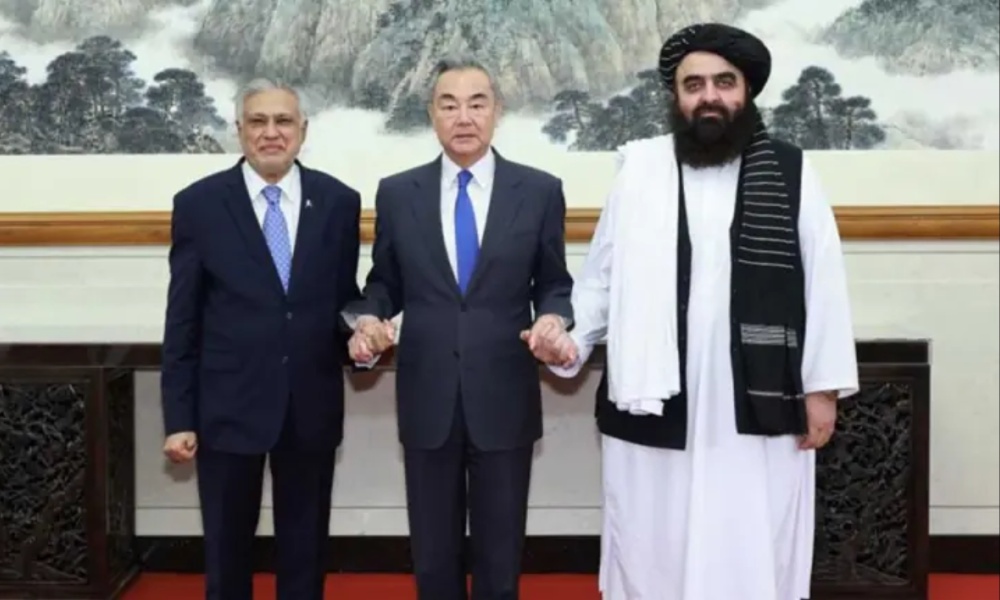
In what is seen as a possible policy shift, Afghanistan’s Islamic Emirate government has been taking action against elements facilitating cross-border attacks into Pakistan — marking a breakthrough that has led to renewed diplomatic momentum between Kabul and Islamabad.
According to Pakistan’s Express Tribune, while public discourse over the past month focused on rising tensions between Pakistan and India, behind the scenes, Pakistan and Afghanistan made significant strides in repairing a strained relationship long marred by security concerns.
At the core of Islamabad’s frustration has been the banned Tehreek-e-Taliban Pakistan (TTP) and other militant groups, which they say operate from inside Afghanistan.
Things however started to change in March, when a high-level Pakistani delegation led by Special Envoy for Afghanistan, Muhammad Sadiq Khan, visited Kabul, the Express Tribune reported.
According to sources familiar with the closed-door meetings, Pakistani officials were, for the first time, convinced that the Islamic Emirate of Afghanistan (IEA) leadership was taking Pakistan’s concerns seriously.
As part of this shift, the IEA reportedly began targeting Afghan nationals who had either joined the TTP or were recruiting others to do so. Several individuals were arrested and prosecuted, according to security sources.
The IEA’s response is believed to have led to a notable reduction in suicide attacks, particularly in Khyber Pakhtunkhwa province, and helped ease tensions between the two neighbors.
The Express Tribune reported that these developments set the stage for a landmark visit by Pakistan’s Deputy Prime Minister Ishaq Dar to Kabul on April 19 — the first by a Pakistani foreign minister in three years.
During the visit, both sides agreed on a renewed commitment: Afghanistan pledged not to allow its territory to be used for attacks against Pakistan, and in return, Pakistan eased trade restrictions, including lifting the requirement of bank guarantees for Afghan importers.
The IEA government further won Islamabad’s confidence by reportedly apprehending Afghan nationals who had facilitated the infiltration of over 70 terrorists into Pakistan following the Pahalgam attack.
All infiltrators were neutralized near the North Waziristan border in what officials described as the largest single-day anti-terror operation since Pakistan’s post-9/11 campaign, Express Tribune reported.
Despite the progress, Pakistani officials caution that more needs to be done. “It’s a positive start, but we expect the Taliban (IEA) government to take irreversible steps,” one official said on condition of anonymity.
China is believed to have played a key behind-the-scenes role in encouraging dialogue between the two countries.
On May 21, Chinese Foreign Minister Wang Yi hosted an unannounced trilateral meeting in Beijing with the foreign ministers of Pakistan and Afghanistan.
Following the talks, both countries expressed their intent to upgrade diplomatic ties, including plans to exchange ambassadors—a move confirmed by Pakistani officials, although formalities remain.
China was the first to appoint a full-time ambassador to Kabul under IEA rule and accept an IEA envoy in Beijing. Russia and Turkey are reportedly considering similar moves.
Pakistani officials say that, despite ongoing concerns, the evolving regional landscape demands a pragmatic approach and that the recent spike in military tensions with India has only reinforced Islamabad’s interest in stabilizing its western frontier.
Meanwhile, India has also started re-engaging with the Islamic Emirate.
Indian External Affairs Minister S. Jaishankar recently held talks with his Afghan counterpart, breaking a 20-year policy of diplomatic non-engagement with the Islamic Emirate.
Analysts suggest the Beijing meeting was a strategic message from China—not only to support regional stability but also to signal to India that Kabul’s future may lie in alignment with Beijing and Islamabad.
Islamic Emirate’s response to Islamabad’s accusations
Leading up to this thaw between the two countries, Pakistan continued to accuse Afghanistan of not standing against militants in the country. The IEA however repeatedly denied these allegations and said on numerous occasions that it will not allow any individual or group to pose a threat to another country from Afghanistan.
Just last month, the IEA’s deputy spokesperson Hamdullah Fitrat dismissed allegations that armed groups are using Afghan territory to launch attacks into Pakistan.
He described the claims as “false” and accused Pakistan of deflecting blame for its own failures.
“Pakistan’s security problems are its internal matter,” Fitrat said. “Blaming Afghanistan is a way for Islamabad to avoid accountability for its own shortcomings.”
These remarks were made in response to comments by Prime Minister Shehbaz Sharif, who, speaking in London in April, stated that terrorist groups were operating from Afghan soil.
Just five days later, however, the high-level Pakistani delegation, led by Ishaq Dar, visited Kabul for talks with senior IEA officials, including Prime Minister Mullah Hassan Akhund.
The one-day visit was on the back of an official invitation extended by Islamic Emirate Foreign Minister Amir Khan Muttaqi.
Opinion
Afghan war crimes victims still awaiting justice: HRW Asia director
Patricia Gossman compares how differently Australia and Britain are handling the issue of war crimes committed by their troops in Afghanistan
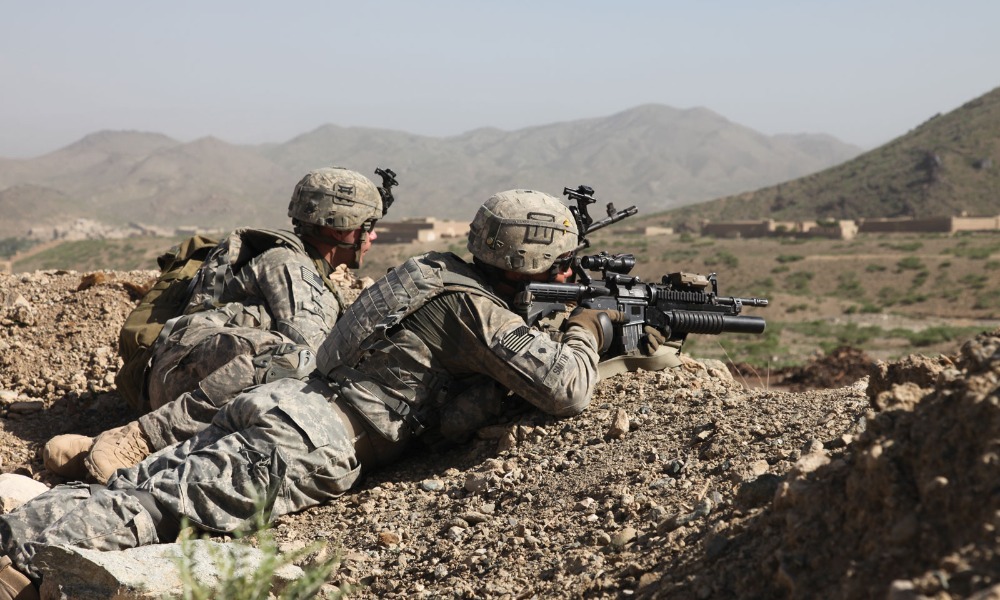
Human Rights Watch Associate Asia Director Patricia Gossman on Monday published an article on the situation of war crimes in Afghanistan over 20 years of foreign occupation and how differently two countries are tackling the issue.
Here’s what she wrote.
Family members of Afghans unlawfully killed by foreign military forces during the 20-year war in Afghanistan have been waiting a long time for justice. Last week revealed two quite different approaches by countries that should provide it.
Australia, which has gone the furthest in investigating alleged war crimes by its forces in Afghanistan, has established a website for family members to file complaints.
The site, managed by Australia’s Defense Ministry, includes an online form in the Dari and Pashto languages to request compensation.
While this progress is commendable, it comes five years after a governmental inquiry first disclosed the extent of probable crimes, including summary executions of captured combatants and civilians. Only one soldier has been charged in connection with the allegations.
The long delays led United Nations special mandate holders in August 2024 to raise concerns about Australia’s approach to compensation “as a form of charity at the discretion of its military, not as a legal right of victims under international law,” and the lack of clarity concerning consultation with victims and their families.
Those concerns remain.
Afghan human rights activists are hosting online panels to draw attention to the website. The Australian government needs to ensure Afghans know about the website and how to file a complaint.
The United Kingdom, meanwhile, which also has an obligation to provide justice for war crimes, has made much slower progress.
Last week, BBC Panorama presented new evidence of war crimes by British special forces in Iraq and Afghanistan, including interviews with former soldiers about summary executions of wounded detainees and civilians, including children.
“They handcuffed a young boy and shot him,” said a former soldier who had served in Afghanistan. “He was clearly a child, not even close to fighting age.”
The UK government has tried its best to prevent such crimes from ever being prosecuted, with successive governments alleged to have covered up crimes and shut down criminal inquiries.
While the government established an independent inquiry into the Afghanistan allegations in December 2022, it has taken years to get going and is limited in scope to the three years 2010-2013.
Richard Bennett, the UN special rapporteur on human rights in Afghanistan, said the new allegations highlighted “the need for comprehensive accountability.”
That is the only way victims and their families will find justice.
Article written by Patricia Gossman
Opinion
Looking back at India and Pakistan’s history of armed conflict as they face a new crisis
India and Pakistan have a complex and largely hostile relationship that is rooted in a multitude of historical and political events
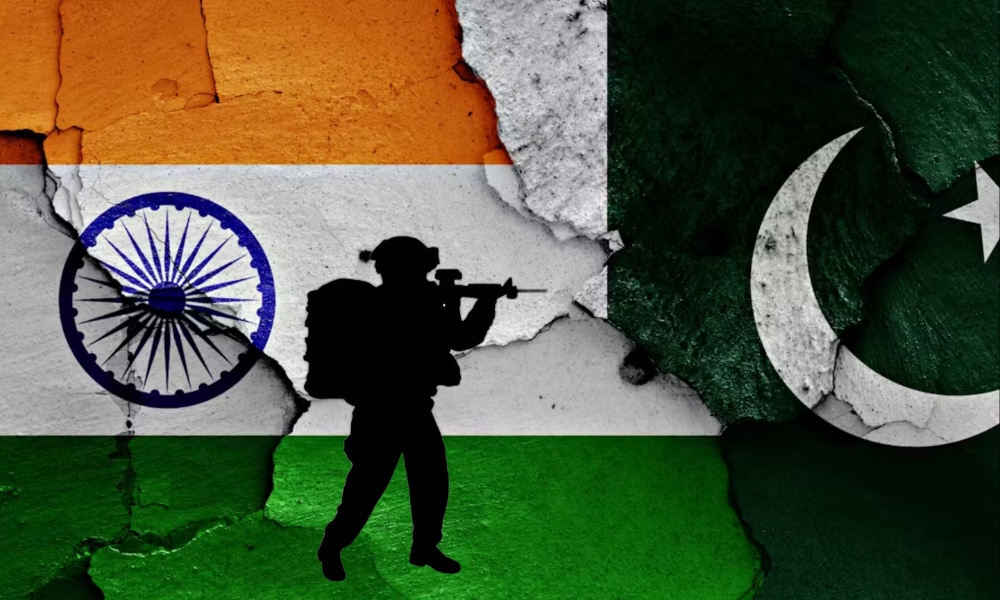
India struck multiple sites inside Pakistani-controlled territory early on Wednesday, two weeks after a deadly attack on tourists in the disputed Kashmir plunged relations between the nuclear-armed neighbours to new lows.
India accused Pakistan of backing the massacre, in which 26 men, mostly Indian Hindus, were killed, a charge Pakistan denies.
Soldiers on each side have since exchanged fire along their de facto border, with each blaming the other for shooting first.
Both countries have in the past two weeks expelled diplomats and citizens, ordered the border shut and closed their airspace for each other.
India and Pakistan have a complex and largely hostile relationship that is rooted in a multitude of historical and political events, most notably the partition of British India in August 1947.
Two years after World War II, the United Kingdom formally dissolved British India, dividing it into two new sovereign nations: the Union of India and Pakistan.
The partitioning of the former British colony resulted in the displacement of up to 15 million people, with the death toll estimated to have reached between several hundred thousand and one million people as Hindus and Muslims migrated in opposite directions across the Radcliffe Line to reach India and Pakistan, respectively.
In 1950, India emerged as a secular republic with a Hindu-majority population and a large Muslim minority. Shortly afterwards, in 1956, Pakistan emerged as an Islamic republic with a Muslim-majority population and a large Hindu minority; it later lost most of its Hindu population following its defeat in the Bangladesh Liberation War of 1971, which saw the secession of East Pakistan as the independent country of Bangladesh.
Since 1947, India and Pakistan have fought three major wars and one undeclared war, and have also engaged in numerous armed skirmishes and military standoffs; the Kashmir conflict has served as the catalyst for every war between the two states, with the exception of the Indo-Pakistani War of 1971, which instead occurred alongside the Bangladesh Liberation War.
Here’s a look at multiple conflicts between the two countries since their bloody partition in 1947.
1947 — Months after British India is partitioned into a predominantly Hindu India and a Muslim-majority Pakistan, the two young nations fight their first war over control of Muslim-majority Kashmir, then a kingdom ruled by a Hindu monarch. The war killed thousands before ending in 1948.
1949 — A UN-brokered ceasefire line leaves Kashmir divided between India and Pakistan, with the promise of a UN-sponsored vote that would enable the region’s people to decide whether to be part of Pakistan or India. That vote has never been held.
1965 — The rivals fight their second war over Kashmir. Thousands are killed in inconclusive fighting before a ceasefire is brokered by the Soviet Union and the United States. Negotiations in Tashkent ran until January 1966, ending in both sides giving back territories they seized during the war and withdrawing their armies.
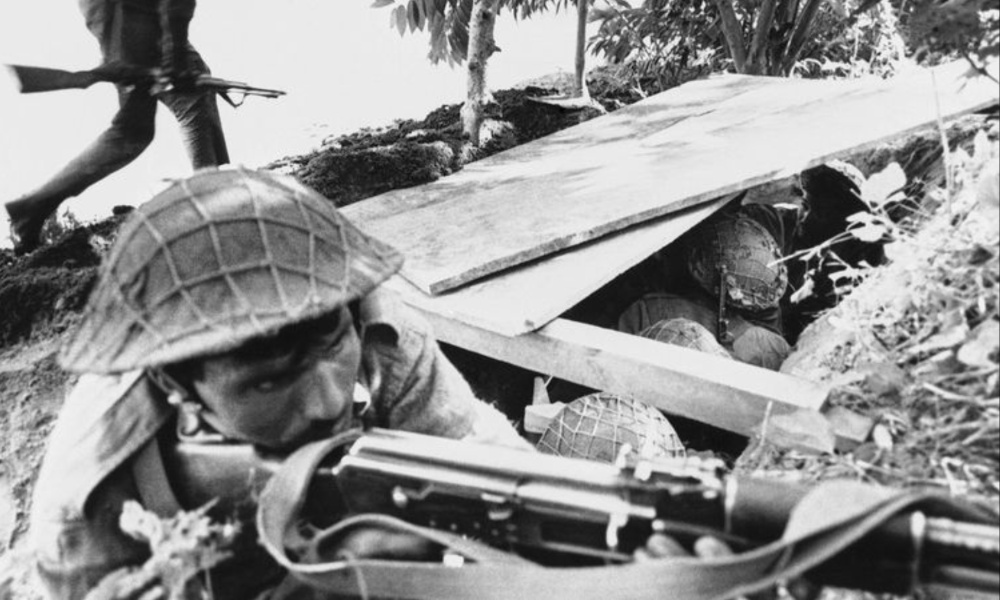
A Pakistani soldier aims his rifle as a fellow soldier runs for cover during Indian shelling of Pakistani positions in East Pakistan on December 2, 1971. (AP)
1971 — India intervenes in a war over the independence of East Pakistan, which ends with the territory breaking away as the new country of Bangladesh. An estimated three million people were killed in the conflict.
1972 — India and Pakistan sign a peace accord, renaming the ceasefire line in Kashmir as the Line of Control. Both sides deploy more troops along the frontier, turning it into a heavily fortified stretch of military outposts.
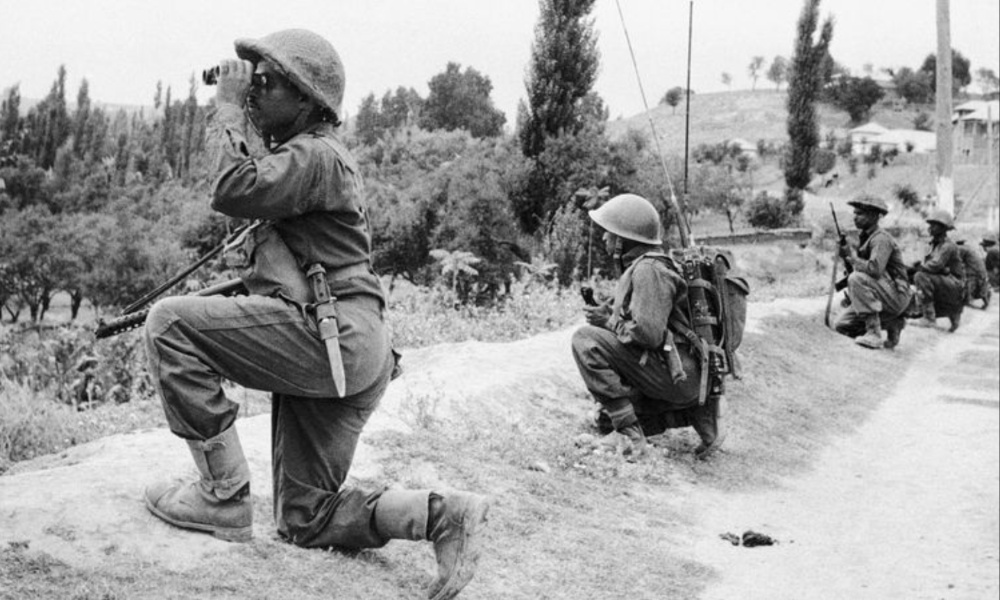
Indian troops are on the move in Kashmir against guerrilla forces during the second war over Kashmir on September 6, 1965. (AP)
1989 — Kashmiri dissidents, with support from Pakistan, launch a bloody rebellion against Indian rule. Indian troops respond with brutal measures, intensifying diplomatic and military skirmishes between New Delhi and Islamabad.
1999 — Pakistani soldiers and Kashmiri fighters seize several Himalayan peaks on the Indian side. India responds with aerial bombardments and artillery. At least 1,000 combatants are killed over 10 weeks, and a worried world fears the fighting could escalate to nuclear conflict. The US eventually steps in to mediate, ending the fighting.
2016 — Militants sneak into an army base in Indian-controlled Kashmir, killing at least 18 soldiers. India responds by sending special forces inside Pakistani-held territory, later claiming to have killed multiple suspected rebels in “surgical strikes.” Pakistan denies that the strikes took place, but it leads to days of major border skirmishes. Combatants and civilians on both sides are killed.
2019 — The two sides again come close to war after a Kashmiri insurgent rams an explosive-laden car into a bus carrying Indian soldiers, killing 40. India carries out airstrikes in Pakistani territory and claims to have struck a militant training facility. Pakistan later shoots down an Indian warplane and captures a pilot. He is later released, de-escalating tensions.
2025 — Militants attack Indian tourists in the region’s resort town of Pahalgam and kill 26 men, most of them Hindus. India blames Pakistan, which denies it.
India vows revenge on the attackers as tensions rise to their highest point since 2019. Both countries cancel visas for each other’s citizens, recall diplomats, shut their only land border crossing and close their airspaces to each other. New Delhi also suspends a crucial water-sharing treaty.
-

 Latest News4 days ago
Latest News4 days agoIEA releases three Pakistani soldiers to mark Ramadan
-
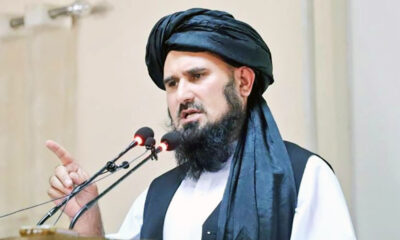
 Latest News4 days ago
Latest News4 days agoAfghanistan’s Chief of Armed Forces underscores readiness and equipment for national defense
-
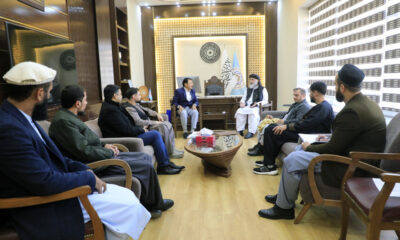
 Latest News2 days ago
Latest News2 days agoAfghanistan welcomes investment and technology partnerships with India
-
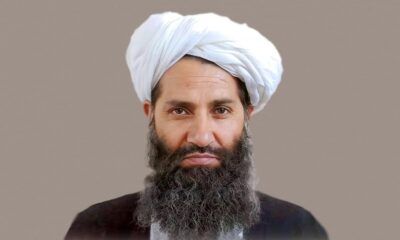
 Latest News4 days ago
Latest News4 days agoGrateful to Afghans and Ulama for obeying the Islamic Emirate, says Hibatullah Akhundzada
-

 Sport3 days ago
Sport3 days agoAfghan Peaks founder climbs Aconcagua to promote Afghanistan’s mountain potential
-

 Latest News2 days ago
Latest News2 days agoIndian customs seize Chinese walnuts falsely declared as Afghan
-

 Business3 days ago
Business3 days agoPakistan allows re-export of stranded Afghan transit cargo
-
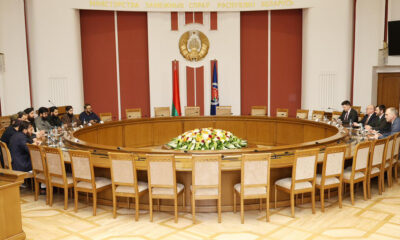
 Business5 days ago
Business5 days agoAfghan delegation visits Belarus to strengthen economic and industrial ties





